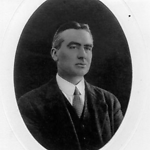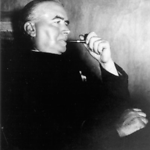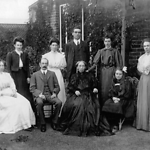Person
Avery, David (1871 - 1956)

David Avery, 1 September 1921
Details
- Born
- 22 February 1871
Bungaree, Victoria, Australia - Died
- 27 October 1956
Berwick, Victoria, Australia - Occupation
- Industrial chemist
Summary
David Avery studied under D.O. Masson at the University of Melbourne 1889-1894 and was head of the chemistry department of the Melbourne Working Men's College 1899-1911. As a consultant he worked for Amalgamated Zinc (de Bavay's) Ltd and other companies until 1933. He was prominent in the development of pulp and paper from Australian hardwoods. Avery helped to establish the firm Tasmanian Paper & Pulp Ltd.
Details
Chronology
- 1892
- Education - Bachelor of Science (BSc) completed at the University of Melbourne
- 1894
- Education - Master of Science (MSc) completed at the University of Melbourne
- 1895 - 1896
- Education - Studied medicine at the University of Melbourne (completed degree?)
- 1897 - 1899
- Career position - Manager of cyanide extractions at Black Horse Mine in Mount Egerton
- 1899 - 1911
- Career position - Head of the Department of Chemistry at the Melbourne Working Men's College (now the Royal Melbourne Institute of Technology)
- 1901 -
- Career position - Foundation member and Office-Bearer of the Society of Chemical Industry of Victoria
- 1904 -
- Career position - Member and Office-Bearer of the Melbourne University Chemical Society
- 1911 - 1933
- Career position - Private Consultant to various companies including, Melbourne and Metropolitan Board of Works, Amalgamated Zinc (de Bavay's Ltd.) and the Electrolytic Zinc Co. of Australasia Ltd.
- 1915
- Career position - Founded Avery & Anderson
- 1916 - 1919
- Career position - Member of the Executive and Special Chemicals Committees of the Commonwealth Advisory Council of Science and Industry
- 1918 -
- Career position - Member and Office-Bearer of the Australian Chemical Institute
- 1919 - 1921
- Career position - Member of the Executive and Special Chemicals Committees of the Commonwealth Advisory Council of Science and Industry
- 1924
- Career position - President of the Rotary Club of Melbourne
Related entries
Archival resources
The University of Melbourne Archives
- David Avery - Records, 1924 - 1936; The University of Melbourne Archives. Details
Published resources
Encyclopedia of Australian Science and Innovation Exhibitions
- Collins, David, Chemistry in 19th Australia - Select Bibliography, An exhibition of the Encyclopedia circa 2005 with assistance from Ailie Smith and Gavan McCarthy., eScholarship Research Centre (original publisher), Melbourne, 2009, https://eoas.info/exhibitions/ciab/ciab_ALL.html. Details
Books
- Brady, Peter H., Avery's Legacy: a History of the Department of Applied Chemistry, RMIT (Melbourne: MBE Business Service Centre, 2004), 297 pp. Details
Book Sections
- Radford, Joan T., 'Avery, David (1871-1956), chemical consultant' in Australian Dictionary of Biography, Bede Nairn and Geoffrey Serle, eds, vol. 7 (Melbourne: Melbourne University Press, 1979), pp. 125-126. http://www.adb.online.anu.edu.au/biogs/A070130b.htm. Details
Journal Articles
- Avery, D., 'The Preparation of Hyponitrites from Ethyl Nitrite in Alcoholic Solutions', Report of the fifth meeting of the Australasian Association for the Advancement of Science, 5 (1894), 320-322, https://www.biodiversitylibrary.org/page/15362516. Details
Resources
- Wikidata, http://www.wikidata.org/entity/Q21536682. Details
- VIAF - Virtual International Authority File, OCLC, https://viaf.org/viaf/95132354. Details
- 'Avery, David (1871-1956)', Trove, National Library of Australia, 2009, https://nla.gov.au/nla.party-1459268. Details
- 'Avery, David (1871 - 1956), Industrial Chemist', RMIT University History, RMIT University Archives, 2022, https://www.lib.rmit.edu.au/university-archives/finding-aids/ohrm/web/biogs/E000002b.htm. Details
Reviews
- Brady, Peter H., Avery's Legacy: a History of the Department of Applied Chemistry, RMIT (2004)
Rae, Ian, Chemistry in Australia, 72 (9), (2005), 39-40. Details
Digital resources
McCarthy, G.J.
Created: 20 October 1993, Last modified: 4 June 2010
- Foundation Supporter - Committee to Review Australian Studies in Tertiary Education


